Cellphones on Airplanes: Round 2
§ 22.925 Prohibition on airborne operation of cellular telephones.
Cellular telephones installed in or carried aboard airplanes, balloons or any other type of aircraft must not be operated while such aircraft are airborne (not touching the ground). When any aircraft leaves the ground, all cellular telephones on board that aircraft must be turned off. The following notice must be posted on or near each cellular telephone installed in any aircraft:
“The use of cellular telephones while this aircraft is airborne is prohibited by FCC rules, and the violation of this rule could result in suspension of service and/or a fine. The use of cellular telephones while this aircraft is on the ground is subject to FAA regulations.”

Yesterday, 11/22, the NY Times reported that Chmn. Wheeler is clarifying his views on the cellphone on airplane proposal that he had announced the previous day. Here is the full statement:
“Yesterday we announced a Federal Communications Commission (FCC) proposal that recognizes that there is no technical reason to prohibit mobile devices from interfacing with the onboard wireless data systems being installed on many aircraft. If the Commission adopts this proposal after the public has had the opportunity to comment it will be only a technical advisory, an update to our rules. There is nothing in the proposal that prohibits airlines from developing whatever in-flight phone usage policy they may wish.
“The job of the FCC with respect to this issue is limited to issues related to communications technology. Technology is available and being deployed today on flights outside the United States that permits use of mobile devices on planes without causing interference to cell phone networks on the ground. These advances in technology likely no longer warrant – on a technological basis – the prohibition of in-flight phone use with the appropriate on-board equipment.
“We understand that many passengers would prefer that voice calls not be made on airplanes. I feel that way myself. Ultimately, if the FCC adopts the proposal in the coming months, it will be airlines’ decisions, in consultation with their customers, as to whether to permit voice calls while airborne. The European Union has had a similar policy since 2008. That experience has demonstrated that it is possible to adjust the on-board communications equipment not to handle voice traffic, thus effectively shutting down any calls.
“We believe that airlines are best positioned to make such decisions. For this reason, our proposal does not impose any requirement that airlines should provide voice connectivity. We encourage airlines, pilots, flight attendants, and the public to engage in our upcoming rulemaking process.”
In order to add some facts to this discussion, we have place at the top of this post the actual present FCC rule which probably goes back to the beginning of cellular in the early 1980s. Note that it forbids the use of cellphones “aboard airplanes, balloons or any other type of aircraft” thus it is not focused on protecting the aircraft’s avionics which was the rationale for the FAA’s Kindle ban that was reversed recently.
While cellphones worked on aircraft on 9/11, use of basic cellphone technology from a high altitude, be is an airliner, a Piper Cub, or a balloon creates real problems for the terrestrial cellular system and this was the rationale for the original rule. At altitude such a phone illuminates many cell base station, either causing interference in many cells or tying up extra spectrum assets. However, today we have new technical options as Chmn. Wheeler alludes to: very low power picocells or femtocells can provide service to cellphones on the plane on standard cellular spectrum. Today’s cellphones, unlike the first generation, have a very complex transmitter power control system under the control of the base station the phone is communicating with. With the resulting use of very low power by both the consumer cellphones and the plane’s picocell or femtocell there is no impact on the terrestrial system and hence the original rule is not needed and could be replaced with a complex rule that stipulates how much power can be used and under what circumstances. (Note - the communications between the picocell/femtocell and the ground must be done on a noncellular frequency such as the longstanding “Airfone” spectrum or a satellite system.)
In the FCC Blog, Roger Sherman, Acting Chief, Wireless Telecommunications Bureau states
As the expert agency on communications, it is the FCC’s role to examine how we regulate the industry, and address unnecessary regulations when possible. In this case we have an outdated rule on our books that has been overtaken by advances in technology. If the technological justification for our existing prohibition is no longer valid, then it is our responsibility to examine ways to update and modernize the rules through an open and transparent rulemaking process.
I fully agree with this general concept.
The technical rationale for §22.925 no longer exists as Chmn. Wheeler stated and as I discussed above. BUT this is not the only technology that is forbidden by an anachronistic FCC rule. Why should this be an immediate priority? There appear to be no petitions requesting this change, while there are other technical petitions in FCC’s petition black hole that have sat without action for literally years. Indeed, it is hard to find anyone even advocating this change!
As I have discussed in the context of the history of Wi-Fi, that ubiquitous system came about from a directive from Chmn. Ferris to actively search for technologies being held back by anachronistic restrictions and to “free” those technologies so they could sink or swim in the marketplace on their own merits.
Now the marketplace for Wi-Fi technology is very different than the marketplace for cellphones on airplanes. Especially after the recently approved American/USAir merger there are fewer and fewer airlines these days and they are desperately searching for ways to extract more fees from passengers.
I strongly support the Commission searching for anachronistic technical restrictions and freeing technology to serve the public. That is what brought us Wi-Fi and that is what brought us the new WiGig 60 GHz technology for wireless connections of video in the home. But the FCC clearly has limited resources and the next year’s deliberations on the incentive auction and the transitions from analog telephony will be very time consuming for FCC leadership and staff. Shouldn’t FCC consider a wide variety of obsolescent regulations for review and prioritize them according to factors such as long term benefit to society and the economy?
If they can’t think of anything else more productive than cellphones on airplanes, they might want to start with ending the current prohibition on all nonexperimental spectrum use above 95 GHz.
Cellphones on Airplanes:
Here We Go Again!
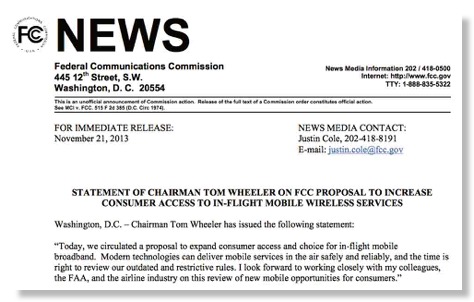
As the Commission approaches 2014 with urgent and critical decisions on IP replacing analog telephony and the incentive auction, it is puzzling that it suddenly want to consider the res judicata issue of cell phone use on airplanes. (Note this is not literally cellphone use on airplanes since use of a full power cellphone at high altitude hits many different cells and ties up significant cellular capacity. The system talked about is the system now used in Europe with essentially a low power femtocell on the aircraft that is connected to the ground via satellite or a noncellular air-to-ground frequency.)
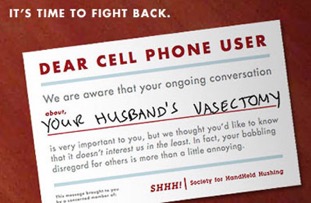
Because the Commission considered this very issue in Docket 04-435, 9 short years ago. Officially, that docket was terminated without a decision because
But a quick review of the record shows that 8,123 (!!!) comments were filed (a large number for EMC issues) and most of them they deal with other than electromagnetic interference issues. Here is a typical comment filed:“(t)he comments filed in response to the NPRM provide insufficient technical information on whether the use of cellular phones onboard aircraft may cause harmful interference to terrestrial networks.”
The AP article on the FCC’s rejection of the proposal was clearI heard on the radio that the FCC is considering allowing cell phone usage on planes. I most urgently beg you NOT TO DO THIS, in the interests of public safety.
If the cellular industry want to have more cellphone use in places where it presently is missing, you blogger humbly suggests they do something about making such use LESS OBNOXIOUS as was made clear in the comments 9 years ago. Here is some guidance from the manual of a cell phone sold in Japan. Even see this in a US cellphone manual or advertising from a US carrier?Striking a blow for cell phone haters everywhere, a government agency on Tuesday said it will keep a rule in place that requires the divisive devices to be turned off during airline flights.The reasoning behind the decision was technical. But the avalanche of comments the Federal Communications Commission has logged from airline travelers have been nothing short of visceral.
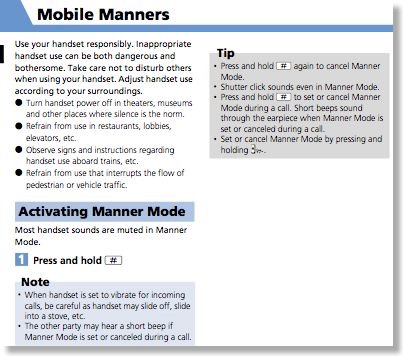
From the manual for a cellphone sold in Japan
We would also urge the industry and proponents of cellphone use in aircraft to review the 2005 study Motorola commissioned study by Don Norman on “Minimizing the annoyance of the mobile phone: The Annoyance, Irritation, and Frustration of The Mobile Phone -- A Design Challenge” and seriously consider Mr. Norman’s recommendations that seem to have been ignored so far.
Cellular technology can add a lot to our society and economy but when poorly designed and promoted it can also contribute to both antisocial use and social friction. The social friction resulting from much current cellphone use, we believe, was the cause of the Docket 04-435 backlash and will continue to be the case unless industry starts addressing it as Japanese industry has.
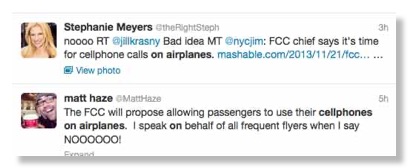
Initial Twitter response
Tip O’Neill, mentor of Chmn. Ferris, famously said “all politics is local”. This is why this initiative is doomed unless the industry “wakes up and smells the coffee”.
Doesn’t the industry ever wonder why people want to jam their product? Let me give them a hint: hotels might have a financial incentive to jam cellphones to get guests to use overprice phones in their rooms. But this is not a problem in practice. Illegal jamming by private parties is generally addressing obnoxious or unsafe uses of cellphones.
Cecilia Kang reports in the Washington Post, “FCC sees backlash after proposing to allow in-flight cellphone calls on planes”, that there is someone who actually likes this proposal.
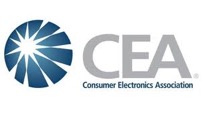
Visit NBCNews.com for breaking news, world news, and news about the economy
UPDATE
If you want an alternative viewpoint, here is “The FCC should get out of the way of cellphones on planes” by Stephen Stromberg, an oped from the Washington Post
I contacted CTIA and asked if they had a statement on the issue, the response was “We do not have a statement.”
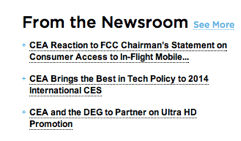
UPDATE
“CEA Reaction to FCC Chairman’s Statement on Consumer Access to In-Flight Mobile Wireless Services” is now available on the CEA website. In it Julie Kearney, vice president of regulatory affairs and Doug Johnson, vice president of technology policy of the Consumer Electronics Association (CEA)®, are quoted as saying:
“Of course, any liberalization of the use of wireless devices on airplanes should not negate general common courtesies. Engaging in phone conversations in flight may prove technically feasible but many may find it socially undesirable…CEA has always held this view and urges airlines to exercise good judgment. All stakeholders should work together to ensure that passengers continue to enjoy comfortable air travel, if voice communications are permitted.”
We congratulate CEA on addressing issues that are “socially undesirable” and hope that the mainstream cellular industry also addresses the social implications of today’s cellular use.
Also to be perfectly objective, the Washington Post on 11/24 published an editorial entitled “The FCC makes the right call on cellphones on planes”. The Post writes
“The immediate impact of the FCC ridding the country of its unnecessary rule, then, may well be small. Yet we hope that carriers explore their options to bring air travel into the 21st century, with all its pluses and minuses. While some passengers mourn the disappearance of their last disconnected refuge, others will embrace the convenience of connection. Either way, there’s no reason for the government to play referee.”
New FCC Website Problems: Did They Foretell the Obamacare Website Fiasco?

On June 30, 2009, Chairman Genachowski told the FCC staff
We will use technology and new media to enhance the everyday worklives of FCC staff, green the agency, and improve overall operations of the FCC – running efficiently, communicating effectively, and opening the agency to participation from everyone affected by the FCC’s actions. And, stay tuned, we will have a new FCC website.
On April 5, 2011 the new site was unveiled. It was developed by MetroStar Systems, a Small Business Administration (SBA) 8(a) company that describes itself as “a leader in full-service information technology (IT) and strategies for new media and enterprise collaboration” and is powered by Drupal, an open source content management system. It also uses cloud technology.
Your blogger has generally defended the new website, however, it clearly has major problems. Despite its modern technology behind the screen and better visual design, it frankly doesn’t make much information any easier to find than the old primitive design. Indeed, it is widely reported that most users still go to the old design which is still operational!
So what does this have to do with Obamacare? Was MetroStar Systems really the best contractor for the job or did the same federal procurement rules the gave the Obamacare contract to CGI Federal limit what firms could effectively bid on the job? Federal contracting laws passed by Congress are nightmarish and for dealing with cutting edge fast moving topics like website design hard to use. Thus the usual contractors are those who have the patience to deal with the complexity of federal contracting, NOT those who can do the best job.
Maybe the problems of the FCC design should have been a tip that such projects under present federal contracting legislation and rules are very difficult to implement.
State AGs to cellphone makers: Install technology to curb thefts
Visit NBCNews.com for breaking news, world news, and news about the economy
NBC Today Show’s Jeff Rossen did a segment this morning on a move by 31 state attorneys general to send letters to “leading cellphone makers Samsung, Motorola and Microsoft demanding the companies ‘take all steps necessary to put consumer safety and security ahead of corporate profits…’ “
The 29 states and two territories signing the A.G.'s letter are Arizona, Arkansas, Connecticut, Delaware, Florida, Guam, Hawaii, Illinois, Indiana, Iowa, Kentucky, Maine, Maryland, Massachusetts, Michigan, Minnesota, Mississippi, Missouri, Nebraska, Nevada, New Hampshire, New Mexico, New Jersey, New York, North Dakota, Oregon, Pennsylvania, Puerto Rico, Rhode Island, Utah, and Vermont.
Microsoft has already said:
“Windows Phone has built in capabilities enabling users to find, lock and even remotely delete data from a lost or stolen phone. We agree this is an industry-wide issue and are working closely with the CTIA and other organizations to address.”
Rossen gave Apple good grades for a feature built in to their latest operating system to “brick” phones although he complained it was somewhat hard to find.
CTIA does have information on links to suppliers of antitheft software. Their main page of information on the topic, Before It's Gone: Steps to Deter Smartphone Thefts & Protect Personal Info, has the statement “CTIA and its members remind you that your personal safety, not your smartphone, should always be your number one priority.” However CTIA carefully avoids the issue of violent smartphone thefts that seem to have motivated the AGs action and appears to focus on protecting the information on the smartphones through remote wiping. The issue of “bricking” phone to make theft unattractive and hence decrease violence.
This is typical of a cellphone industry trend to minimize the unintended consequences of their products, be they
- RF safety concerns or
- use of cell phones in prisons or
- anonymous cellphone use by criminals
- or the “uglification” of communities with cell towers that were designed with no attention to their environment
Video from CTIA website - Note being mugged is not given as one of the “stages of losing a cellphone” and the woman that lost the phone does not appear to have any injuries - unfortunately not always the case!
Other coverage:
NY Daily News
Mass AG
Village Voice
UPDATE
On December 30, 2013 FCC Commissioner Pai tweeted:
A gun-toting mugger in Central Park was so disappointed by his victim’s cheap flip phone that he handed it back." http://nypost.com/2013/12/29/central-park-mugger-rejects-flip-phone/ …
This is one of the realities that the cellular industry is trying to ignore: If you make use of smartphones in urban areas dangerous because they are too valuable to thieves since they can’t be “bricked” readily, urban users may go back to “flip phones” and “feature phones” and avoid the highly profitable but possibly dangerous smart phones.
Thus bricking phones quickly and effectively is really in everybody’s interest!
Wheeler Chairmanship Starts with New Openness
The Wheeler Chairmanship got off to a good start with the above meeting with the FCC staff which is shared with the public for the first time. Also released was a Chairman Wheeler's Blog entry entitled "Opening Day at the FCC: Perspectives, Challenges, and Opportunities”.
A previous announcement gives the names of new senior staff appointments.
A good start!

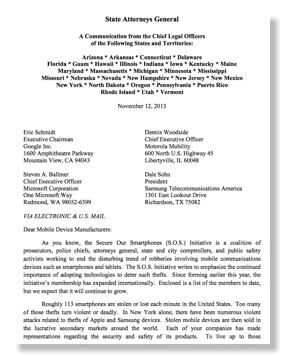
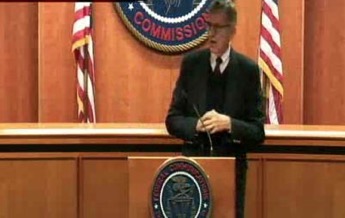


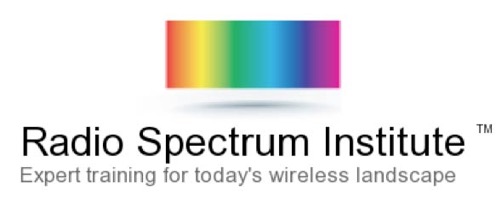


![Validate my RSS feed [Valid RSS]](valid-rss-rogers.png)

